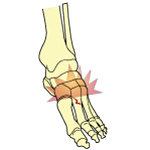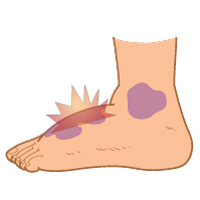 What is a Stress Fracture?
What is a Stress Fracture?
A stress fracture is a small crack in a bone that’s caused by repetitive strain. While stress fractures can occur in any bone, the bones in the feet are particularly vulnerable. This is due to the fact that the feet bear the weight of your body and absorb the impact of your footfalls.
 Causes
Causes
When the muscles in your feet weaken due to fatigue, they can no longer absorb stress during physical activity. This means the stress is absorbed by any nearby bones. When this happens over a long enough period of time, the bone is at risk of stress fractures.
While athletes of all types are at risk, runners are the most likely to develop stress fractures. Changes to physical activity, such as an increase in mileage, change to exercise surface, or increase in time spent working out can lead to stress fractures.
Other causes can include improper footwear, osteoporosis, and rheumatoid arthritis.
Signs & Symptoms
Signs and symptoms of a stress fracture include:
- Bruising
- Pain that goes away with rest
- Pain that worsens with physical activity
- Tenderness in the affected area
- Swelling in the foot and/or ankle area
Treatment Options
Many people often make the mistake of returning to physical activity too soon when they have stress fractures, because the pain may go away and everything may seem healed, but it’s not. You need to rest and allow yourself to fully heal before you resume your usual level of activity.
 RICE – Rest is important when you have a stress fracture. You need to try to keep the weight off your affected foot as much as possible. Ice will help manage the pain. Compression will work to relieve any swelling you’re experiencing. Elevating your foot will work to bring down the internal inflammation.
RICE – Rest is important when you have a stress fracture. You need to try to keep the weight off your affected foot as much as possible. Ice will help manage the pain. Compression will work to relieve any swelling you’re experiencing. Elevating your foot will work to bring down the internal inflammation.
Painkillers – NSAIDs such as Advil and Aleve will help to alleviate pain as well as reduce the inflammation.
Crutches – You may want to consider using crutches to help you keep the weight off your injured foot.
Proper Footwear – If your stress fracture may be the result of improper footwear, look into shoes that will provide support. Your footwear should not be too loose or too tight. Try to avoid high heels.